The Monson Papers, an ‘indispensable record of British national life’, has been purchased and incorporated into the collections of Lincolnshire Archives thanks to grants of £242,500 from the National Heritage Memorial Fund and £20,000 from the Friends of National Libraries.
These papers are an extensive archive containing artworks, letters and travel papers spanning around 700 years. The core collection dates from 1221 to 1947 and comprises the estate archive of the Monson family, the Barons Monson of Burton by Lincoln, together with family and personal records and antiquarian papers. The collection also contains important records of domestic life, with everything from receipts for furniture and paintings to family recipes. These records provide a fascinating insight into the everyday lives of people in the 18th and 19th centuries.
When the collection was initially offered for sale, there was a serious risk that the records would be withdrawn from Lincolnshire Archives (their home since 1951) and dispersed among private collectors. Indeed the diaries and other material documenting the life and work of the Jamaican planter and slave owner Thomas Thistlewood, which once were part of this collection, were withdrawn in 2010 and subsequently sold to the Beinecke Library at Yale University. These grants therefore ensured that this important piece of British history will remain accessible to the public and for future generations to explore.
The collection contains documents of a national and international significance, including:
- Correspondence of the diplomat Sir Edmund John Monson, first baronet (1834-1909) who held positions in Europe, Washington (at the start of the Civil War) and South America, including Ambassador to Vienna and then to Paris.
- Correspondence of the Hon. Charles Monson, Deputy Paymaster General, concerning the American expedition; Pelham’s correspondence with George Colebrook, Deputy Paymaster for the West Indies expedition; and correspondence to Pelham about affairs in Virginia and Jamaica, and more, 1739-1744.
- Correspondence and documents relating to public life and office and to parliamentary elections.
- Travel journal kept by Captain George Elers during his tours of Europe in 1816 and France in 1825.
- Memoirs of the mathematician John Speidell (fl. 1600-1634), known for his early work on the calculation of logarithms.
- An early 14th century fragment of the Constitution of Pope Clement V, which once belonged to Bardney Abbey. This volume, which is comprised of 34 beautifully written leaves, is the finest illuminated manuscript held at Lincolnshire Archives
